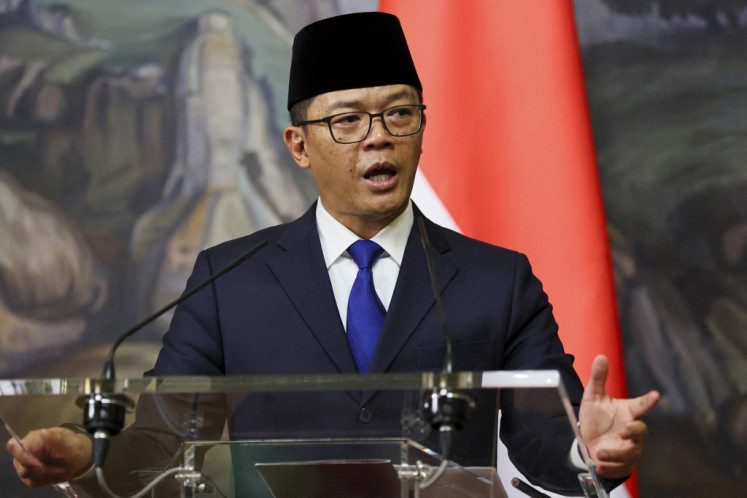Popular Reads
Top Results
Can't find what you're looking for?
View all search resultsPopular Reads
Top Results
Can't find what you're looking for?
View all search resultsIndonesian activist sows seeds for future cannabis industry
As Thailand begins to follow the global trend of relaxing laws around medicinal cannabis, a Jakarta-based activist is campaigning to change public perceptions and Indonesian policy so that patients suffering from chronic disease and pain can also access the potentially life-changing treatment
Change text size
Gift Premium Articles
to Anyone

A
s Thailand begins to follow the global trend of relaxing laws around medicinal cannabis, a Jakarta-based activist is campaigning to change public perceptions and Indonesian policy so that patients suffering from chronic disease and pain can also access the potentially life-changing treatment.
Dhira Narayana of Lingkar Ganja Nusantara, Indonesia’s cannabis movement, has been working with a network of NGOs, volunteers, patients and doctors to research how a domestic medicinal cannabis market might look and what needs to change for it to become a reality.
“We want to prepare the ground for future industries by focusing on research into medical benefits from our local cannabis plant,” he said
Since 2010 he has advocated for medicinal cannabis by encouraging research about its economic and public health potential in Indonesia.
“We want to talk about assumptions, the data, the facts about cannabis in Indonesia, because as you know there was not even a single piece of research about cannabis here when I started.”
Much like Thailand, which has the potential to be a world-leading supplier of medicinal cannabis, Indonesia has a climate that allows the plant to grow naturally and in abundance, allowing many people to take advantage of its medicinal properties.
In the Sumatran province of Aceh, parts of the wilding plant are widely used in food and medicine.
During the last decade, a wave of international science and anecdotal evidence has illuminated the efficacy of cannabis as a treatment for many conditions from insomnia to chronic pain.
While cannabis’ historical negative perception has stunted research, studies have shown that it is effective in treating child epilepsy such as Dravet syndrome and Lennox-Gastaut syndrome (LGS), which typically do not respond to anti-seizure medications, according to the Harvard Medical School.
Pressure from within the medical community has led to unprecedented changes to legislation, especially in the United States, allowing doctors to prescribe cannabis to patients and for growers to legally cultivate it.
Through his advocacy work and research Dhira has met Indonesians who also rely on cannabis for treatment, including a 17-year-old boy in Yogyakarta who suffers from cerebral palsy-related seizures.
“I’ve seen the benefits for a boy called Musa who has cerebral palsy. Without treatment he would have three to four attacks a day. [He] could not speak, had difficulty breathing. With cannabis extract there have been no more attacks. His mother Dwi has her son back, but because of the policy [drug law] the mother decided to stop.”
As in many societies in the 20th century, public perception of cannabis in Indonesia suffered from the global propaganda and misinformation about its harmful effects. This has led to some of the most entrenched stigma and prohibitive laws in the world.
Indonesia’s 2009 Narcotics Law lists cannabis as a type-1 narcotic alongside 65 other drugs including opium, cocaine and methamphetamine.
While the law presents the greatest obstacle to the progress of Indonesia’s medicinal cannabis industry, Dhira said public perception was a major issue, and few people knew about the medicinal, non-psychoactive properties of cannabis.
Cannabidiol (CBD) is one of the main ingredients of cannabis and the key component in its medicinal application. However, according to the World Health Organization, CBD by itself has little to no psychoactive affects and therefore does not cause a high.
In the US and Europe, CBD products such as oil and capsules are available to patients for purely medicinal use. According to the New Zealand Hemp Foundation, the products are about becoming healthy, not high.
While more research is needed before the products can be available or produced here, Dhira said that Indonesians had been using cannabis for its medicinal properties for centuries.
“They used the seeds to cook and also they used the roots of cannabis and they boiled it for diabetics. In Aceh the doctors support our movement.”
“And of course, I see the economic potential, because it is like a weed it can grow anywhere in Indonesia, it’s big money for Aceh.”
In a hearing at the House of Representatives last month, a lawmaker from Islam-based Prosperous Justice Party (PKS) even suggested that the Trade Ministry export marijuana.
The PKS politician Rafli, a lawmaker from House Commission VI overseeing trade and industry whose electoral district is Aceh province, said marijuana was not as dangerous as most people might have thought, and that cannabis could even be used as an alternative for medical treatment.
Market research has estimated the global cannabis industry to be worth upward of US$50 billion by 2025 meaning a huge potential revenue stream for Indonesia if cannabis or industrial hemp were ever an export commodity.
As a low-maintenance crop that absorbs more CO2 per hectare than any forest, it could also prove to be a sustainable and attractive alternative to controversial oil palm, which is being excluded from European markets due to the destruction of Southeast Asian rainforests.
However, Dhira does not want a potential cannabis industry turned into a giant corporate mechanism, and would rather it operate on a grassroots business model, owned and managed by local farmers who have
a vested interest in taking care of the land.
“Now I do the research, what’s the best regulation for Indonesia to regulate the cannabis market?” he said. “We don’t want it to be like palm oil, bad for the environment. We want to be more social and more local. Small but everywhere.”
“That’s what I’m thinking, I’m still working on it.”
– The writer is an intern under the ACICIS program.









